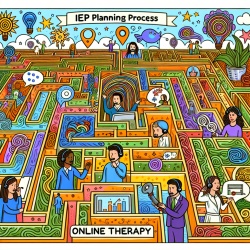Introduction
In the realm of pediatric cardiology, the intersection of congenital heart disease (CHD) and psychological well-being presents a unique challenge. Adolescents with CHD are at a significant risk for psychological problems, which can adversely affect their overall health and quality of life. A recent pilot study titled "Identifying Predictors of Psychological Problems Among Adolescents With Congenital Heart Disease for Referral to Psychological Care" sheds light on this critical issue, offering insights that can empower practitioners to improve outcomes for these vulnerable patients.
Understanding the Study
The study conducted a retrospective review of adolescents aged 12-17 with CHD, aiming to identify predictors of psychological problems using machine learning (ML) algorithms. The findings revealed that approximately one-third of these adolescents experienced psychological issues, with attention-deficit/hyperactivity disorder (ADHD), anxiety, and depression being the most prevalent.
Interestingly, while routine clinical data failed to predict psychological problems in general, specific models for depression and ADHD showed promising accuracy. This indicates the potential of ML in developing targeted interventions.
Implications for Practitioners
The study highlights the importance of integrating psychological assessments into routine cardiac care. Here are some actionable steps practitioners can take:
- Adopt Predictive Models: Utilize ML models to identify adolescents at risk for specific psychological issues, such as depression and ADHD. This can facilitate early intervention and referral to psychological care.
- Comprehensive Care Plans: Incorporate mental health evaluations into the standard care protocol for adolescents with CHD. This holistic approach ensures that psychological well-being is addressed alongside physical health.
- Continuous Education: Stay informed about advancements in predictive modeling and precision medicine. This knowledge empowers practitioners to leverage data-driven insights for better patient outcomes.
Encouraging Further Research
The pilot study serves as a foundation for further exploration into the predictive modeling of psychological problems in adolescents with CHD. Future research could focus on:
- Validation of Models: Conducting multisite studies to validate the accuracy and reliability of predictive models across diverse populations.
- Integration of Socioeconomic Factors: Expanding models to include socioeconomic and cultural factors that may influence psychological outcomes.
- Development of Comprehensive Tools: Creating user-friendly tools that integrate predictive models into clinical workflows, enabling seamless referrals to psychological care.
Conclusion
As pediatric cardiologists, we have the opportunity to make a profound impact on the mental health of adolescents with CHD. By embracing data-driven approaches and integrating psychological care into our practice, we can enhance the overall well-being of our patients. The journey towards comprehensive care is ongoing, and with continued research and collaboration, we can unlock the full potential of predictive models in improving mental health outcomes.
To read the original research paper, please follow this link: Identifying Predictors of Psychological Problems Among Adolescents With Congenital Heart Disease for Referral to Psychological Care: A Pilot Study.










